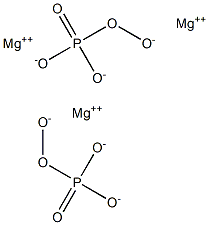Magnesium peroxyphosphate has remained
unknown and little to no publications concerning this
salt are available on the scientific literature. Like the
other alkaline earths, magnesium peroxyphosphates
could be prepared by both solid-state or solution
methods. The two sets of compounds would likely
differ. For the monoperoxyphosphates, one would get
MgHPO5 for the former method and perhaps a hydrate
for an aqueous solution. The question of degree of
hydration remains unknown.
In the solution method, one could use the acid, H3PO5
or the potassium salt K2HPO5. Whether the solution
should be acidic or basic is not known. Like the other
alkaline earths, it is probably best to prepare the acid in
a nonaqueous solution like carbon tetrachloride and
then add the potassiumcompound for the basic solution:
P2O5 + 2H2O2 +H2O ? 2H3PO5
2H3PO5 + KOH ? K2HPO5
To either of these is added the magnesium compound
to form the monoperoxyphosphate:
Mg(OH)2 + K2PO5 ? MgHPO5 +H2O
For the diperoxy compounds, the potassium monoperoxyphosphate
compound is transformed to the diperoxyphosphate
compound, in a nonaqueous solution at
low temperature:
K2HPO5 + P2O5 ? K2P2O8
For magnesium, the probable compounds that will be
formed are:
MgHPO5 or Mg2P2O8
Other possible compounds are:
Mg(H2PO5)2
Mg(H2P2O8)2

